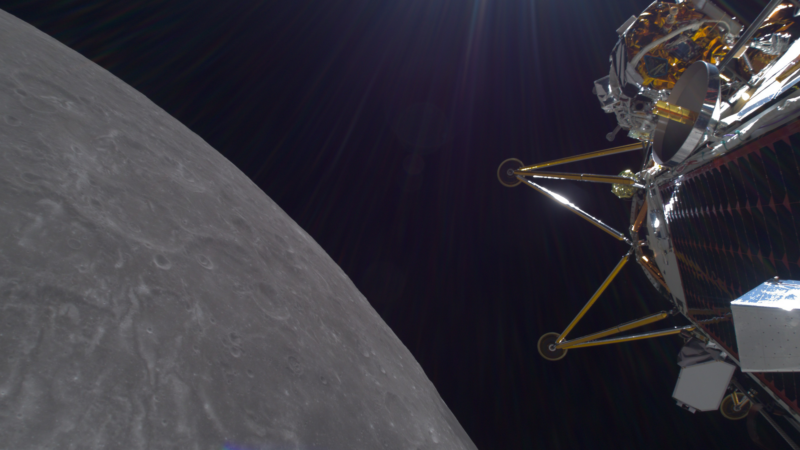Intuitive Machines probe is on the moon but its status is uncertain
A commercial lunar lander built by Intuitive Machines has landed on the moon in a second try for the Houston-based company after its first attempt last year resulted in a lander tipped over on its side.
The touch down occurred around 12:30 EST. The uncrewed Athena lander made an autonomous decent at Mons Mouton, a flat-topped mountain around 100 miles from the moon’s south pole. The site is the farthest south of any lunar soft-landing.
It wasn’t immediately clear, however, whether the company’s Athena lander had suffered the same fate as its predecessor. Mission control reported that it had powered down some flight systems and that the craft was generating solar power. But there was no immediate word on whether the vehicle was in an upright configuration.
“I’m showing that we are sensing lunar acceleration,” mission director Tim Crain told the Intuitive Machines team in mission control. “So we’re on the surface, let’s evaluate.”
The company says it plans an update at 4PM Eastern Time.
The solar-powered probe is a little over 15 feet tall, which according to the company is “roughly the height of a shorter adult giraffe.” On board is a drill built by NASA that will drill about three feet below the lunar surface to check for volatile compounds, including water.
Some craters near the south pole of the moon are in permanent shadow, and researchers believe there might be water ice hidden beneath the surface. That water would be essential for any future moon base, which would use it for drinking and as rocket fuel. Multiple nations are vying to be the first to the lunar south pole and lay claim to some of the water, if its there.
The Athena probe is designed to stay put once it lands, but it’s carrying a number of little rovers that will take a look around. One, called Grace, will hop across the lunar surface using a small rocket engine. Another small rover will attempt to drive autonomously around the lunar surface. Japan’s Dymon Corporation has also included a tiny roly-poly little device called YAOKI, that will snap a few pictures.
Landing on the moon is difficult. Because it has no atmosphere, landers can’t depend on parachutes or other passive equipment to slow their descent. On top of that, the distance from the moon to the earth makes human control impossible, so robotic probes must touch down autonomously. That means the probe must fire rocket engines in a precise sequence to steer its way past rocks, craters and other obstacles, in order to find a perfect landing site.
Adding to the difficulty is that commercial missions frequently operate on a lower budget in exchange for a higher risk of failure. That danger was apparent yesterday, when NASA said it had lost contact with another mission called Lunar Trailblazer that was sharing a ride with Athena to the moon.
Last year, Intuitive Machines became the first commercial mission to touch down on the lunar surface, but it wasn’t a complete success. The probe misjudged its rate of descent and hit the moon hard, snapping a leg and tipping onto its side.
The Intuitive Machines landing comes less than a week after another company, Firefly Aerospace, made its first-ever successful landing on the lunar surface. Both missions are part of NASA’s Commercial Lunar Payload Services initiative, which is seeking to harness private industry to explore the moon.
Auburn tabs USF’s Alex Golesh as its next coach, replacing Hugh Freeze on the Plains
The 41-year-old Golesh, who was born in Russia and moved to the United State at age 7, is signing a six-year contract that averages more than $7 million annually to replace Hugh Freeze. Freeze was fired in early November after failing to fix Auburn’s offensive issues in three seasons on the Plains.
Alabama Power seeks to delay rate hike for new gas plant amid outcry
The state’s largest utility has proposed delaying the rate increase from its purchase of a $622 million natural gas plant until 2028.
Former U.S. Sen. Doug Jones announces run for Alabama governor
Jones announced his campaign Monday afternoon, hours after filing campaign paperwork with the Secretary of State's Office. His gubernatorial bid could set up a rematch with U.S. Sen. Tommy Tuberville, the Republican who defeated Jones in 2020 and is now running for governor.
Scorching Saturdays: The rising heat threat inside football stadiums
Excessive heat and more frequent medical incidents in Southern college football stadiums could be a warning sign for universities across the country.
The Gulf States Newsroom is hiring an Audio Editor
The Gulf States Newsroom is hiring an Audio Editor to join our award-winning team covering important regional stories across Mississippi, Alabama and Louisiana.
Judge orders new Alabama Senate map after ruling found racial gerrymandering
U.S. District Judge Anna Manasco, appointed by President Donald Trump during his first term, issued the ruling Monday putting a new court-selected map in place for the 2026 and 2030 elections.









